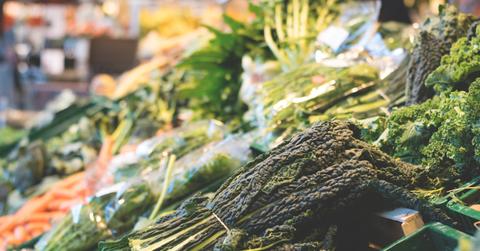Biogas Harnessed From Food Waste Can Power Homes
The startup SEab Energy is developing a system to turn would-be food waste into enough energy to power homes, supermarkets, and even hospitals.
Updated Nov. 19 2020, 9:38 p.m. ET
There are many companies and individuals attempting to solve the world's massive food waste problem. One organization is attempting to clarify food labels to curb waste; affordable smart fridges keeps track of expirations dates; and some companies are even turning food waste into other products, including Misadventure Vodka, which uses discarded starches to distill its liquors.
All of these initiatives are attempting to solve a big problem. In the U.S., it's estimated that we throw away 133 billion pounds of food every year. In the world, nearly one third of the total food produced ends up in the trash. Now, one company is trying to harness that waste and turn it into renewable energy.
SEaB Energy is working to develop a closed-loop system that turns a neighborhood or business into its own power plant, eliminating a large amount of what would otherwise be thrown away and using the decomposition process to produce biogas that is converted into electricity.
“Right now that’s what we’re working on: neighborhood-based systems,” Sandra Sassow, CEO of SEaB Energy, told Wired. “We’re looking at future cities, and this prediction that the majority of humans will live in megacities around the world. When you look at what those megacities are about, could you change the way waste is handled in them, and make it decentralized and have it back at the building level so that nothing’s moving off-site?”
SEaB is betting on it. The company has developed two products designed to transform waste into energy on a small scale: the Flexibuster, which is designed for urban environments, and the MuckBuster, which is designed for agricultural areas. Both are relatively small – they currently fit inside a shipping crate – making them easy to fit into apartment and office buildings.
The trash-to-energy systems use anaerobic digestion, a series of biological processes in which microorganisms break down biodegradable material. One of the end products is biogas, which is combusted to generate electricity and heat, or can be processed into renewable natural gas and transportation fuels. In this case, it will be combusted into electricity and heat.
Sassow says this this system is more reliable than even wind and solar energy because there is never a lack of waste.
“Using waste, you’re tying [power] to the amount of waste available on the site," she said. "So your fuel source is constant; your output of energy can be consistent, constant and predictable.”
One hurdle is getting people to get over the "ick" factor of using waste. But Sassow believes if they start in areas that are already more involved in the process of their waste – areas with waste segregation systems, for example – eventually it will catch on.
The company currently has two case studies underway, which are already proving the efficacy of and interest in the technology. The first is a hospital in Southampton, U.K., and the other is a nonprofit housing development called Place in San Francisco. The latter is designed not only to test the waste system, but to simultaneously offer a solution to the city's housing crisis.
"It’s based around creating low-cost housing around urban areas to retain young companies and artists in the fabric of the cities," Sassow told Wired, "and the way they’re getting the subsidized housing is through the use of waste and solar together as a source of power which they’re selling back to the grid."
So not only can this system alleviate food waste and power entire housing blocks, it can also create affordable housing opportunities. Welcome to the city of the future.
